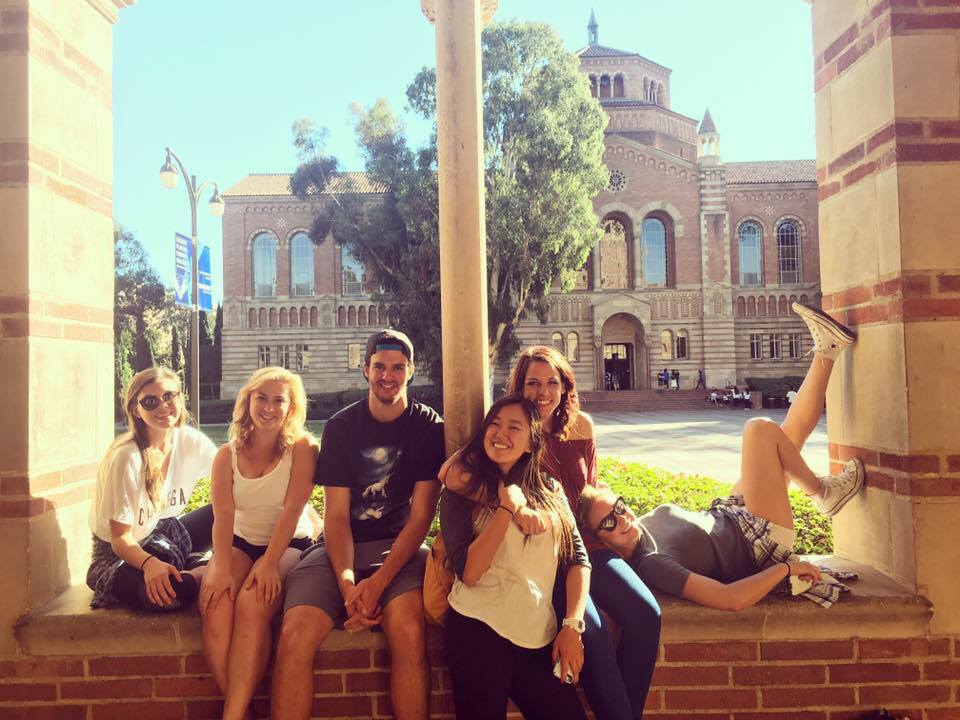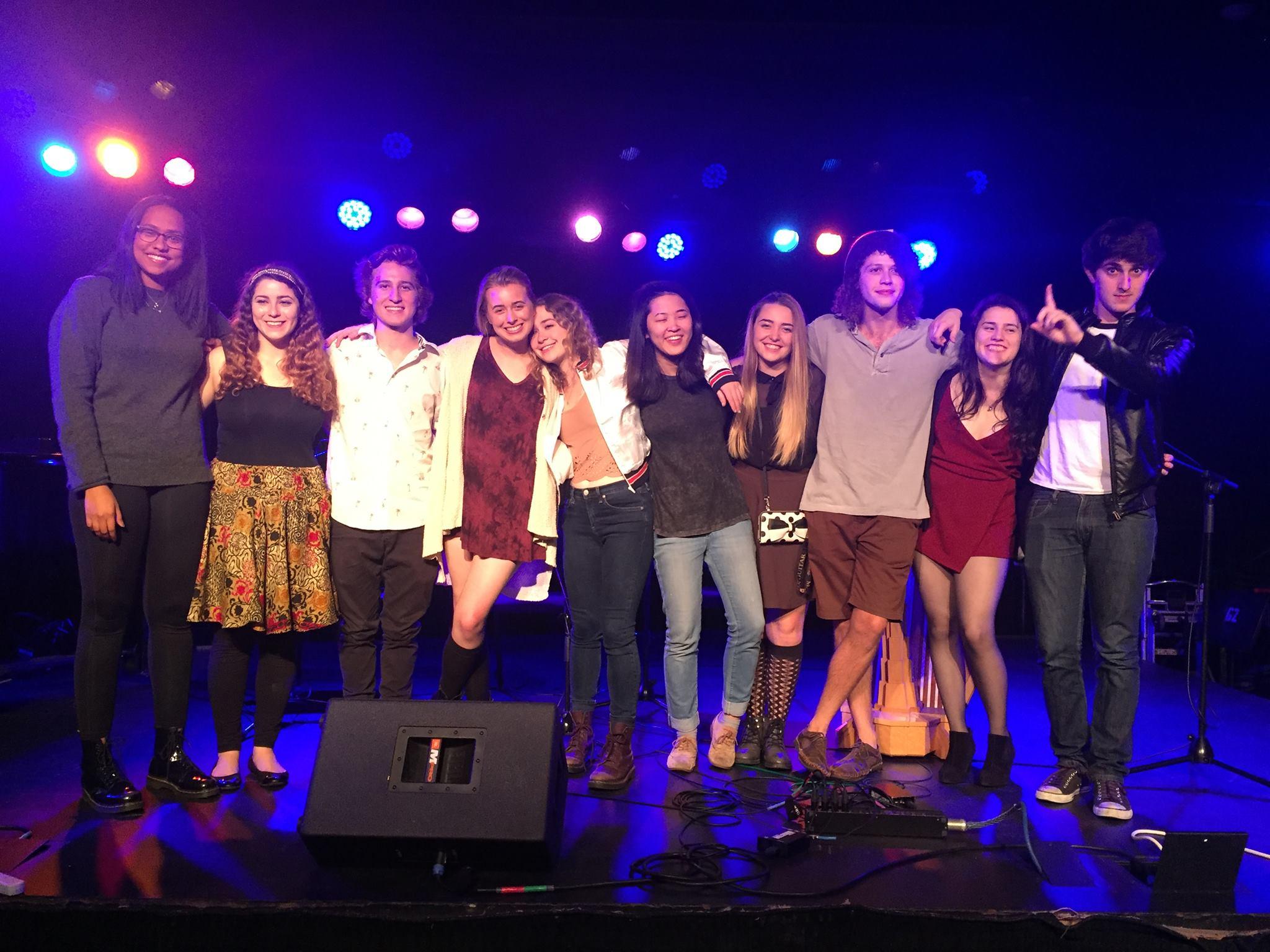When Kat Calvert ’15 was accepted to UCLA, she was at first a little hesitant about the prospect of attending a college less than 25 minutes from her house.
Both of her parents went to the school, and the alma mater has played a significant role in her life from the very beginning.
“I’ve been going to UCLA camps since I was 5 months old,” Calvert said.
She applied out of state as well, but there was clearly a strong family attachment to the Los Angeles school. Without a doubt, she was overjoyed to receive the letter of acceptance, but a small part of her was still worried that she might miss out on the full “college experience” by not relocating further.
“Being super close to home was always a concern,” Calvert said. “But, going into it, me and my parents talked about it, and we had set rules. I wouldn’t really go home; they wouldn’t come visit me a lot.”
A few months into it now, she said she couldn’t be happier with her decision to attend UCLA.
“I love it. It’s so surreal being here,” Calvert said. “And I am absolutely still getting to have a ‘college experience.’”
She doesn’t commute; she lives in a dorm with new friends from across the country. She rarely visits home, but said she is happy to know she has that option. But, she does occasionally see her parents tailgating at games, which she said has been a lot of fun.
“Another one of the nice things about going to college close to home is that, for example, I had to go to this film festival a while ago, and I wanted to run home to grab some nicer clothes,” Calvert said. “And it’s right there. I’m also involved in a lot of different organizations on campus. And sometimes we’ll need drivers for events and it’s nice because I can just go home and pick up my car and help out.”

Calvert said she also thinks there is a lot of merit in going to an in-state college in California, specifically especially in Los Angeles, despite it being the city most students at Harvard-Westlake have grown up in.
“I think Los Angeles is a great place to go to school,” Calvert said. “There’s a lot to do in the city. We’ve gone to the beach a couple of times.”
According to The Chronicle of Higher Education, in a study taken in 2010, about 84 percent of California undergraduate students end up staying in state for college.
There are a number of reasons for this, including opting to stay closer to family for health or personal reasons and often times, but not always, attending a school in-state is cheaper, given that airfare and travel expenses are cut out.
Upper school dean Sharon Cuseo said that students especially at Harvard-Westlake seem to be “eastern-centric,” given the high reputations and well-known competitiveness of those universities, and they often forget that there are schools just as selective and enriching here in California.
She said she has seen a trend in the application process where students will go in expecting to solely apply out of state. But, as they are are better exposed to the variety of selective, small and large, diverse and more local-reaching colleges through the process, they usually end up applying to a few in-state schools by the end.
However, it should be included that according to a compilation of the latest data submitted by colleges to the U.S. Department of Education, there has been a recent surge in California students studying away from home. In 2010, more than 27,000 high school graduates started college at an out-of-state, four-year university. This number is 90 percent larger than that of 2000.
While not all 27,000 of these graduates attended school on the East Coast specifically, this study furthers the idea that many students believe, if given the opportunity, they have to get away as far as possible after high school in order to start a fresh, independent, new college life.
Cuseo says this is a common misconception.
“In most schools, there will be geographic diversity [of students],” Cuseo said. “A big part of college is learning to react to people from different backgrounds. At close schools even, like USC or Claremont McKenna College, some students realize that they might as well be in Maine. It’s a whole new experience.”
Changing schools, being exposed to a large group of brand new people, attempting to settle into new routines – The idea of going to college, any college, can be overwhelming enough for some people, Cuseo said. And this unfamiliar excitement is not lost by attending a school closer to home. After all, when it comes down to the wire, a new school is a new school.
But, depending on the person, they may find comfort in taking those big adjustments a little piece at a time. They can do this by choosing to stay closer to home, opting to preserve a degree of familiarity.
Some high school graduates find it very beneficial to be familiar with the area before attending college there.
“Being in the city I grew up in just meant one less thing to adjust to in a time full of pretty big adjustments – socially, academically, and emotionally,” Jensen McRae ’15 who attends the USC Thornton School of Music said. “I definitely feel like I’m having the full college experience; I’m just in a city that I recognize.”
On top of the personal developmental benefits, being able to stay close and more involved in family matters has its advantages for some students, upper school counselor Luba Bek said.
“From my experience, some people who go to local colleges do so either because there’s a special program like for dance or theater, or they hate the cold, or there’s family issues, and they want to stay close to home,” Bek said. “You have to find where you feel at home.”
McRae chose USC for “having everything [she] could want out of a university, and only being a few freeways away from the house [she] grew up in.” But, being close to her family, she said, was definitely a bonus.
“The advantages of staying close for college are literally endless,” McRae said. “I have a very close family, and getting to see my parents and little brother whenever I want is a huge plus. Also, as a pop music major, I have performances every few weeks, and they’re always able to come see them, a luxury that my friends from across the country are denied.”

McRae chose USC over a name-brand college in the northeast region of the country, and said that the family aspect she knew she would find at USC helped her make her final decision.
There is also a wide selection of colleges not in Los Angeles, but still in-state. They are still close, like the cluster of colleges in Claremont or the UCs along the coast, but they offer a bit more distance from home.
“Developmentally, I do believe people need life exposure to something not in their comfort zone, though,” Bek said. “Southern California has its own culture – and if that’s the only culture you’ve ever know, I do think you’re missing out.”
There are certainly advantages to staying close for college and studying further away. Factors such as finances, family ties, and personal interests play large roles in the final college decision.
The deans, Cuseo said, want to remind students to not solely look at the schools with most distinguished reputations in the northeast sector when there are schools just as selective and prestigious across the nation.
There is a school out there for everyone, Bek said, and there are so many. It’s up to the student to decide if that school is less than a half hour away from home or two plane rides away.
“Los Angeles is an incredible city and there’s so much you still haven’t explored, I promise,” McRae said. “And being able to come home after a rough week to sleep in your own bed, eat home-cooked meals, and play with your dog is perhaps the greatest feeling in the world.”






























